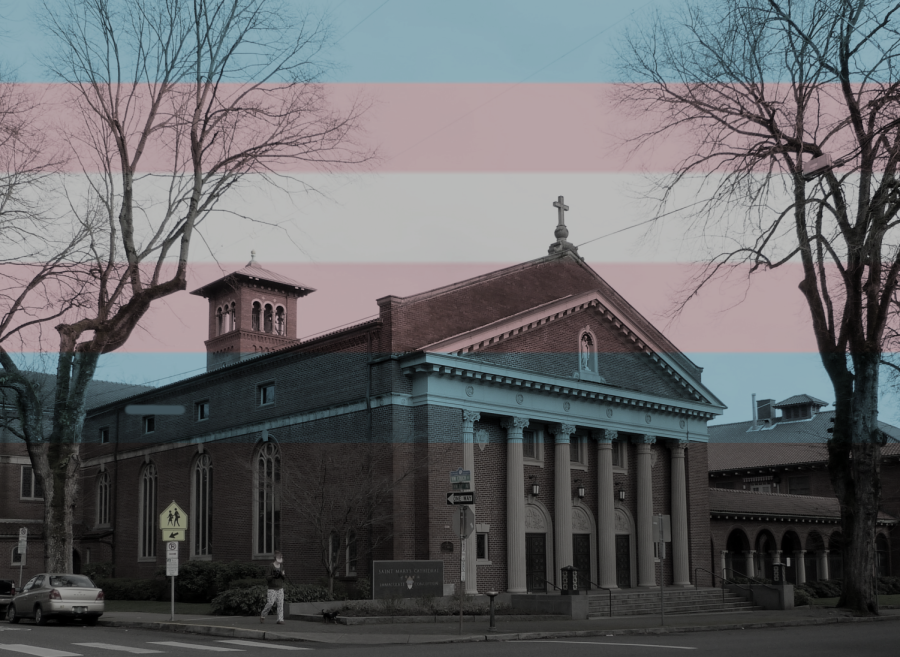Archbishop’s transgender regulations send ripples through Catholic schools
A transgender pride flag is overlaid atop a photograph of St. Mary’s Cathedral of the Immaculate Conception, the seat of the Archdiocese of Portland. The archdiocese published the document “A Catholic Response to Gender Theory” which affects the Catholic high schools in the greater Portland area regarding transgender issues.
April 19, 2023
On Jan. 25, the Archdiocese of Portland, which oversees Portland Catholic schools and has jurisdiction over their teaching, posted a document titled “A Catholic Response to Gender Theory” regarding the gender expression of students. The 18-page document is available on the archdiocese’s website. It includes guidelines preventing students from using pronouns that do not align with their assigned genders at birth and barring Catholic institutions from displaying imagery that supports what the archdiocese refers to as “gender identity theory.”
This document is part of a conversation about gender expression that has become increasingly contentious. Legislatures around the nation are proposing new bills that restrict gender identity and expression. Within just the past few months, Florida legislators have advanced a bill to ban lessons on gender identity and sexual orientation in classrooms and Tennessee has passed a bill banning access to gender-affirming surgery for minors.
In February, Archbishop Alexander Sample, who heads the archdiocese, participated in an interview with The Catholic World Report to explain his reasoning. In the interview, Sample asserted that gender-affirming care such as hormone therapy and gender reassignment surgery were misguided and out of line with Catholic doctrine. His decision has affected students at local Catholic schools.
A student at St. Mary’s Academy, who requested to remain anonymous to protect their personal information, said that the document’s initial release caused students to be fearful of their safety.
“One of my friends [left the school] because she didn’t feel safe or respected there,” they said. “She said there’s been some problems with [the administration] being really homophobic.”
A different anonymous senior at Central Catholic High School echoed these sentiments, citing their transgender friend who feared that they would have to switch schools for their personal safety.
“The transgender community is pretty small at my school,” they said. “So I know only a handful of people and that everyone was definitely stressed out… Everyone was very on edge about it.”
An anonymous transgender student at a Portland Catholic school who requested keeping any identifying information anonymous to protect their safety also voiced the effect the policy had on their well-being.
“For me personally, it’s been hell. I don’t feel safe or comfortable in a place where I thought would become a home for me,” they said. “Each trans person I come across here has had their own experience of what it’s like, and I feel that it has taken a toll on our mental health.”
All three students said that thus far they have not noticed significant differences in the operation of most of their school activities and that their schools have remained silent about the statement.
However, the transgender student noted an inability to move into rooming with students of the same gender they identify as during an overnight trip, instead being forced to room with students of their assigned sex at birth.
“I had a personal experience in which I attempted to switch to a room that housed people with a different sex assigned at birth. In the end, I was unable to switch,” they said. “…I had to swallow up my identity and suck it up.”
The Central Catholic student recalled a conversation with one of their teachers that could explain the reason for the schools’ silence on the issue.
“[My teacher] said that they had a meeting where they said nobody should mention it,” the student said. “My school is known for being on the more progressive side, so they don’t really have authority to talk out against the archdiocese … I guess the principal decided the best thing to do is just to not say anything.”
The student also denounced the document from the archbishop, saying that although they were aware there were issues between LGBTQ+ students and the archbishop, they were surprised that things would be taken so far.
“The entire world is creating a problem where there isn’t one, believing that trans people are a threat that needs to be detained,” the transgender student said. “I am furious that I have to suffer through this injustice just because I am different.”
The St. Mary’s student agreed, saying that the teachings of Catholicism could and should be compatible with the modern acceptance of LGBTQ+ and transgender rights.
“If [God] made people who were born in the wrong body but wired to be the other one or somewhere in between or any gender that they feel, that is beyond human comprehension,” they said. “God doesn’t make mistakes.”




